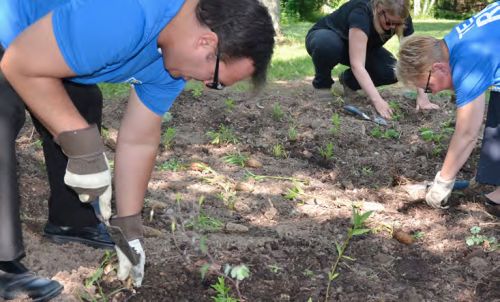Protect water quality, plant rain gardens

By Hope Brock, Ausable Bayfield Conservation
A rain garden is one way people and groups in your community can manage stormwater runoff in towns, villages, and other urban centres. Rain gardens are shallow depressions that contain soil and plants that treat pollutants and promote infiltration. The Main Bayfield community included rain gardens in the Main Bayfield Watershed Plan as a method to manage urban stormwater.
People in the Main Bayfield Watershed, a priority area along Lake Huron’s southeast shore, plan to construct and plant a rain garden in June at Pioneer Park. The rain garden will serve as a demonstration project to encourage similar projects on private property. Funds from the Great Lakes Guardian Community Fund support the rain garden project. Pioneer Park applied for the grant with Municipality of Bluewater and Ausable Bayfield Conservation as partners. The project will include planting days with volunteers and local schools and interpretive signs.
The Bluewater Beach Committee (Municipality of Bluewater; Huron County Health Unit; Pioneer Park Association; and Ausable Bayfield Conservation) is working to engage people in stormwater management improvements in this priority area. Citizen scientists have been actively monitoring water quality from stormwater outlets along the beach for two years.
Here are some ways you can take positive action to manage stormwater runoff in towns and villages along and near Lake Huron’s southeast shore:
- Reduce or eliminate the use of fertilizers containing phosphorus.
- Use designated car wash centres to wash vehicles.
- Plant native plants, which require less fertilizer and water. Native plants occur naturally in a region and are therefore suited to local growing conditions. Examples include Joe-pye Weed, Blue Vervain, and Black-eyed Susan.
- Install permeable pavement. This is concrete or asphalt that allows water to drain through and into soil.
- Leave lawn clippings and mulch leaves as opposed to piling leaves on curbsides.
- Purchase and use a rain barrel. This provides you with a needed source of water for landscaping and it helps protect water quantity and water quality.
- Install filter strips, grass swales and rain gardens to slow water and increase filtration. Grass swales are open vegetated channels that slow stormwater, promote infiltration, and trap and treat pollutants.
- Protect and create more naturalized areas. Naturalized landscapes include trees, and shrubs and flowers. These natural areas absorb more rainwater than a regular patch of grass. Visit abca.on.ca for tree order and wetland restoration information or visit this page.
For more information contact your local conservation authority or conservation agency.
